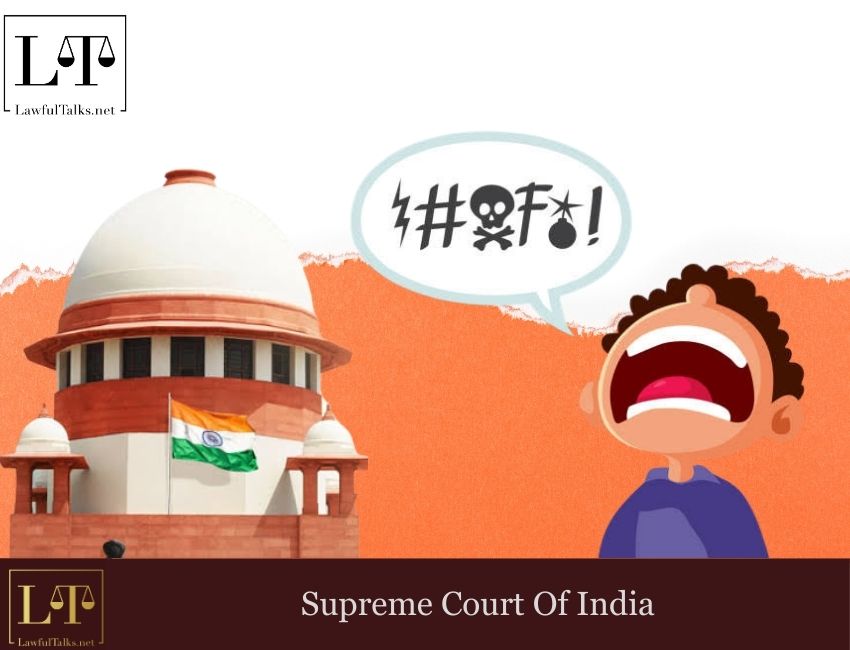Allahabad HC Sets Aside Afzal Ansari's Conviction, Allows Him to Continue as MP

The Supreme Court in its recent judgement pronounced that Mere Application of Filthy language without any context that suggests an intent to offend modesty doesn't fall under S.506 IPC.
The Supreme bench of Justice Dipankar Datta and Justice Prashant Kumar Mishra were considering an appeal challenging the Karnataka High Court's decision. The High Court had declined to quash the chargesheet filed against the Appellants for offences under Indian Penal Code (IPC) Sections 323, 504, 506, 509, and 511 and emphasized the need for a careful evaluation of the evidence.

The Complainant in the instant case alleged that she faced ongoing harassment from the company's management and was coerced into resigning under duress, with the threat of immediate termination. On October 25, 2013, between 2:00 p.m. and 3:00 p.m., the Human Resources Manager allegedly forced her to resign and barred her from returning to work. The chargesheet alleges that the Appellants physically assaulted the complainant, confiscated her company-provided laptop, and prevented her from accessing its data. Additionally, the appellants were accused of scolding the complainant in "filthy language" and forcibly terminating her employment. Furthermore, with the assistance of security personnel, the appellants are said to have had the complainant removed from the premises of the Company.Initially, a Non-Cognizable Report (NCR) was registered, indicating no cognizable offence. However, 58 days later, on December 23, 2012, a FIR was filed under Sections 323, 504, 506, 509, and 511 of the IPC. The Court examined whether the allegations against the Appellants, even if accepted as true, fulfilled the necessary ingredients for offences under Sections 323, 504, 506, 509, and 511 of the IPC and whether the chargesheet and proceedings should be quashed.
Regarding Section 323 (voluntarily causing hurt), the Court emphasized that a conviction requires proof of actual bodily pain, disease, or infirmity caused by a voluntary act. The complaint stated that the complainant was forcibly ejected from the office by security personnel, who allegedly attempted to assault and threaten her. However, it did not attribute any direct voluntary act of causing hurt by the accused. Thus, the Court found that, prima facie, the offence under Section 323 was not made out in either the complaint or the chargesheet.
Further, the Court examined whether the alleged use of "filthy language" by the Appellants was sufficient to establish offences under Sections 504 and 509 of the IPC.
For Section 504 (Intentional insult to provoke breach of peace), the Court clarified that a mere insult is not enough; it must be shown that the insult was intentional and likely to provoke the Complainant into breaching public peace or committing an offence. In this case, the complaint did not mention any use of "filthy language" by the appellants, nor did it allege that the complainant was provoked into any unlawful act. Therefore, the Court concluded that Section 504 was not applicable in this case.
The court then proceeded to examine the evidence to determine if the appellants had the intent or knowledge to insult the complainant’s modesty. Simply using filthy language, without context or supporting gestures, does not fall under Section 509 IPC. If specific words, contextual details, or gestures had been cited, they might have helped establish criminal intent. Considering the case objectively, the appellants' actions do not indicate the required intent to insult modesty. Furthermore, the failure to mention the use of any "filthy language" in the complaint and the fact that this allegation is only found in the chargesheet; the Court pointed out that there are serious concerns regarding the claim of insulting modesty of the complainant by the appellants. Thus, the court determined that the offense under Section 509 of the IPC was not constituted
The bench later scrutinized the applicability of Section 506 in this case. It observed that the complaint does not attribute any threats or intimidation to the second accused, so Section 506 IPC does not apply to him. The claim that the first accused acted on his behalf is invalid since Section 34 IPC (vicarious liability) was not invoked. For criminal intimidation to be established against the first accused, intent to cause alarm must be proven. However, the complaint primarily alleges illegal termination, a civil dispute, not criminal intimidation. The complainant has also challenged her termination before the labour court. Given these facts, Section 506 IPC is not made out against either accused.
“After a thorough examination of the matter, including a review of the materials on record: viz., the complaint, the FIR, and chargesheet, we are of the view that none of the ingredients of Sections 323, 504, 506, and 509 of the IPC are present, even if they are taken at face value and accepted in their entirety. The complaint is bereft of even the basic facts, which are absolutely necessary for making out an offence. Since the ingredients of the offences under the aforementioned sections have not been made out, the charge under Section 511 of the IPC cannot stand” the court observed.
The court concluded that the discrepancies suggested a possible attempt to reclassify the proceedings from non-cognizable to cognizable offences or to convert a civil dispute into a criminal matter, potentially to pressure the appellants into settling with the complainant.
The court was of the opinion that the criminal proceedings were initiated by the complainant with mala fide intentions, possibly to exact vengeance, cause harm, or force a settlement.
Hence, the Court set aside the High Court order and quashed the criminal proceedings against the appellants.
Case Title : MADHUSHREE DATTA VS. THE STATE OF KARNATAKA 39276/2019
Advocate For Appellant: Senior Advocate Sidharth Luthra & ors
Advocate For Respondents: D.L. Chidananda & ors
Special Leave to Appeal (Crl.) No(s). 10115/2019



































































































































































































































































































































































































































































































































































































































































































